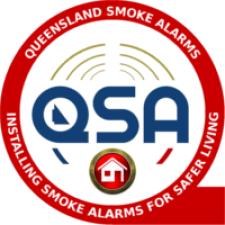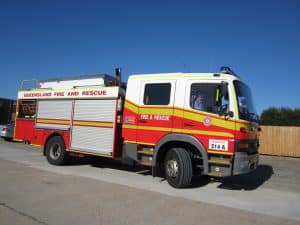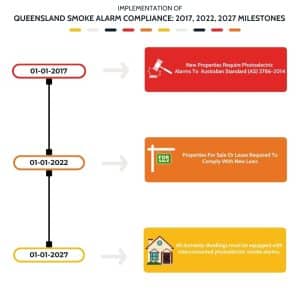The core of Queensland’s commitment to fire safety is the Queensland Fire & Emergency Service (QFES), the state body for fire protection and preventive efforts. The QFES’s role is not just about firefighting, it is one of the primary designers and is the policy creators for the state’s smoke alarm legislation, which helps push the installation of modern detection methods.
This legislation was created because of a history of house fire incidents and the need to increase safety awareness and protection provided for all occupants. The organisation’s focus on helping to create laws mandating interconnected, photoelectric smoke alarms demonstrates an understanding of the dangers and loss of life that can occur when people do not have sufficient warning about fires within their home.
With the introduction of these new regulations, QFES aims to do more than enforce rules; it’s about fundamentally enhancing the safety of Queensland homes. The new implemented changes are rooted in an understanding of past loss and risks associated with residential fires. By including the move to new, modern, interconnected smoke alarm systems, QFES is taking a big step towards reducing the occurrence of fires, minimising injuries, and hopefully, ultimately saving lives. This initiative not only demonstrates QFES’s commitment to fire safety but also marks a crucial shift in how fire risks are managed, impacting the well-being and security of all Queensland residents.
Historical Evolution of Fire Safety Legislation in Queensland.
In Queensland’s move to improved fire safety legislation, pivotal moments have helped shape its trajectory. The Slacks Creek house fire in 2011, a profound tragedy that claimed numerous lives, highlighted the inadequacies of the then existing smoke alarm systems and regulations surrounding them. This amongst other events became pivotal incidents underscoring the necessity for more advanced, better detection and warning systems in residential houses.
In response, the Fire and Emergency Services (Domestic Smoke Alarms) Amendment Act 2016 was enacted, bringing about a significant increase in fire safety standards.
Commencing January 1, 2017, this Act mandated the implementation of interconnected, photoelectric smoke alarms, in phased stages, to better manage the risks posed by fires.
This legislation is representative of Queensland’s and the QFES’s commitment to help protect its citizens using the best possible policy tools and the best technology available.
2024 Smoke Alarm Mandates: Queensland’s Enhanced Safety Standards
As of 2024, Queensland’s law mandates specific requirements for smoke alarms to boost home fire safety. The legislation requires interconnected, photoelectric smoke alarms in all residential properties.
These alarms, known for their rapid detection of smoke and fires, and significantly increase the chances of early fire detection and safe evacuation. The interconnected feature ensures that when one alarm is triggered, all alarms sound, providing an effective alert system throughout the home. This requirement is key to Queensland’s approach to fire safety, emphasising the importance of modern, reliable smoke detection technology in protecting residents and making sure that residents have the best possible warning when fire strikes.
QFES Enforcement: Upholding Smoke Alarm Safety Standards
The Queensland Fire & Emergency Services (QFES) actively enforces the state’s smoke alarm legislation to ensure public safety. The new legislation spells out the way in which smoke alarms need to be maintained and who is responsible for the alarms remaining complaint.
QFES’s role is not just to implement but also to ensure adherence to these critical safety standards, helping reduce the risk of fire incidents in residential properties. For more detailed information on your responsibilities and rights regarding smoke alarms in your property, you can refer to our website and the pages providing information for the different stakeholders involved:
Spreading Awareness: QFES’s Campaigns for Smoke Alarm Safety
QFES often engages in various public awareness campaigns to educate the community about the importance of smoke alarm safety. As well as highlighting the changes to the legislation and how that affects the various people/stakeholders who need to be aware of how to become and remain compliant with their smoke alarms. These initiatives include informative resources and educational programs that emphasise the life-saving role of smoke alarms. The image below is an example of one of the information campaigns the QFES undertook to promote awareness.
QFES’s commitment to raising awareness is pivotal in ensuring that households are well-informed about fire safety practices and the latest requirements for smoke alarms.

Enhancing Fire Safety: The Impact and Future of Smoke Alarm Legislation
The impact of Queensland’s smoke alarm legislation, introduced in phases starting from 2017, has already been felt throughout Queensland with many homes, being built, sold or leased, needing to become compliant through using the new equipment or updating the existing smoke alarms in a property.
This change, and changes to the law, has been a significant step in fire safety when compared to the previous era in Queensland.
The future amendments to this legislation, evolving to meet emerging technologies and community feedback, include a key milestone:
In 2024, under Queensland’s smoke alarm legislation, homeowners selling their properties must have interconnected photoelectric smoke alarms installed. These alarms must be compliant with Australian Standards and interconnected so that all alarms activate simultaneously. This requirement ensures that every level of a property, including bedrooms and paths of travel, is covered for optimal fire safety. The legislation places responsibility on property owners to ensure compliance, and non-compliance may result in penalties. For instance if compliant smoke alarms are not installed by the settlement date when a property is sold then the buyer is entitled to adjust the price of the property sale by taking 0.15% off at the time of settlement.
By 1 January 2027, all owner-occupied homes must comply with these stringent standards, ensuring a uniform level of fire safety across Queensland. This proactive approach reflects Queensland’s commitment to continually adapting fire safety regulations to current needs and advancements.
The Queensland Fire & Emergency Services will continue to play a pivotal role in regulating smoke alarm compliance through their use of promotional campaigns, increasing the public’s awareness of those changes and to continuing advocating for the increased safety of occupants.
We here at Queensland Smoke Alarm services can help support you in meeting your compliance requirements by offering upgrades, replacements and installation services, all complying with QFES’s regulations to enhance fire safety in homes.
For further information or help you can contact us here or refer to our prices and services page here
Bibliography




